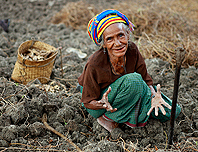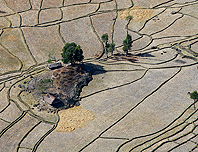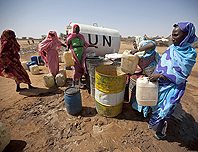DESA News
Volume 17, No.08 - August 2013
Trends and analysis
 The Open-ended Working Group on Ageing, established to strengthen the protection of the human rights of older persons, will hold its fourth session on 12-15 August 2013 in New York.
The Open-ended Working Group on Ageing, established to strengthen the protection of the human rights of older persons, will hold its fourth session on 12-15 August 2013 in New York.
The working group, established by the General Assembly in its resolution 65/182 aims at considering the existing international framework of the human rights of older persons and identify possible gaps and how to best address them, including by considering, as appropriate, the feasibility of further instruments and measures.
The fourth session is open to representatives of Member States of the United Nations, representatives of organizations of the United Nations system and observers of intergovernmental and non-governmental organizations, which have been accredited.
A programme of work, an agenda and a list of speakers will be posted on the Open-ended Working Group’s website before the meeting commences. In addition, a compilation of existing international legal instruments, documents and programmes that address the human rights situation of older persons, inputs from Member States, the UN system and civil society organizations as well as modalities for participation of NGOs can be found on the website.
The Open-ended Working Group’s session will be in a similar format than the previous sessions. Interactive expert panel discussions will be followed by an interactive dialogue. It will take place at UN headquarters in conference room 3.
For more information: http://social.un.org/ageing-working-group/fourthsession.shtml
 The 10th UN Regional Cartographic Conference for the Americas (UNRCC-A) will be held from 19 to 23 August at the United Nations Headquarters in New York
The 10th UN Regional Cartographic Conference for the Americas (UNRCC-A) will be held from 19 to 23 August at the United Nations Headquarters in New York
The theme of this conference will be “United Nations Global Geospatial Information Management and the Americas, addressing global challenges through geospatial information”. This meeting provides a regional forum where government officials, planners, scientists and experts from the Americas and other regions meet to address their common needs, problems and experiences in the field of surveying and mapping, cartography, hydrography, remote sensing, land and geospatial information systems.
The objectives of this conference are numerous. First, it aims at receiving reports on the work being done to advance geospatial information management and assess the status of the resolutions adopted at the Ninth United Nations Regional Cartographic Conference for the Americas. It is also an opportunity for conference delegates to share experiences, knowledge and best practices on geospatial information management (GIM) at all levels. It will allow representatives from Member States to gain greater understanding of the relevance and work of the United Nations Global Geospatial Information Management (UN-GGIM) Committee of Experts, GIM issues being addressed in addition to the strategic direction and related program of work. Finally, it will help Member States and supporting stakeholders to identify existing and new opportunities for increased regional and global collaborations aimed at advancing GIM for sustained economic development of the Americas.
Speakers from 16 Member States and eight international geospatial information organizations will be addressing the following topics: strategy, policy, economic and institutional issues; spatially enabling government; geospatial data collection, management and dissemination; best practices and applications; and climate change and disaster risk reduction.
For more information: http://unstats.un.org/unsd/geoinfo/RCC/unrcca10.html
 The Intergovernmental committee of experts on sustainable development financing will hold its first meeting from 28-30 August at UN Headquarters in New York.
The Intergovernmental committee of experts on sustainable development financing will hold its first meeting from 28-30 August at UN Headquarters in New York.
At the United Nations Conference on Sustainable Development (or Rio+20) in June 2012, Heads of State and Government recognized the need for significant mobilization of resources from a variety of sources and the effective use of financing, in order to give strong support to developing countries in their efforts to promote sustainable development.
They agreed to establish an intergovernmental process under the auspices of the General Assembly, to assess financing needs, consider the effectiveness, consistency and synergies of existing instruments and frameworks, and evaluate additional initiatives, with a view to preparing a report proposing options on an effective sustainable development financing strategy. The strategy is to facilitate the mobilization of resources and their effective use in achieving sustainable development objectives.
An intergovernmental committee, comprising 30 experts nominated by regional groups, with equitable geographical representation, has been tasked to implement this process, concluding its work by 2014. The committee is expected to draw on technical support from the UN system, and to conduct its work in open and broad consultation with relevant international and regional financial institutions and other relevant stakeholders.
The committee was established on 21 June 2013 with the adoption of General Assembly decision 67/559 which defines the membership of the committee.
For more information: http://sustainabledevelopment.un.org/index.php?menu=1557
 The Open-ended Working Group on Ageing, established to strengthen the protection of the human rights of older persons, will hold its fourth session on 12-15 August 2013 in New York.
The Open-ended Working Group on Ageing, established to strengthen the protection of the human rights of older persons, will hold its fourth session on 12-15 August 2013 in New York.

